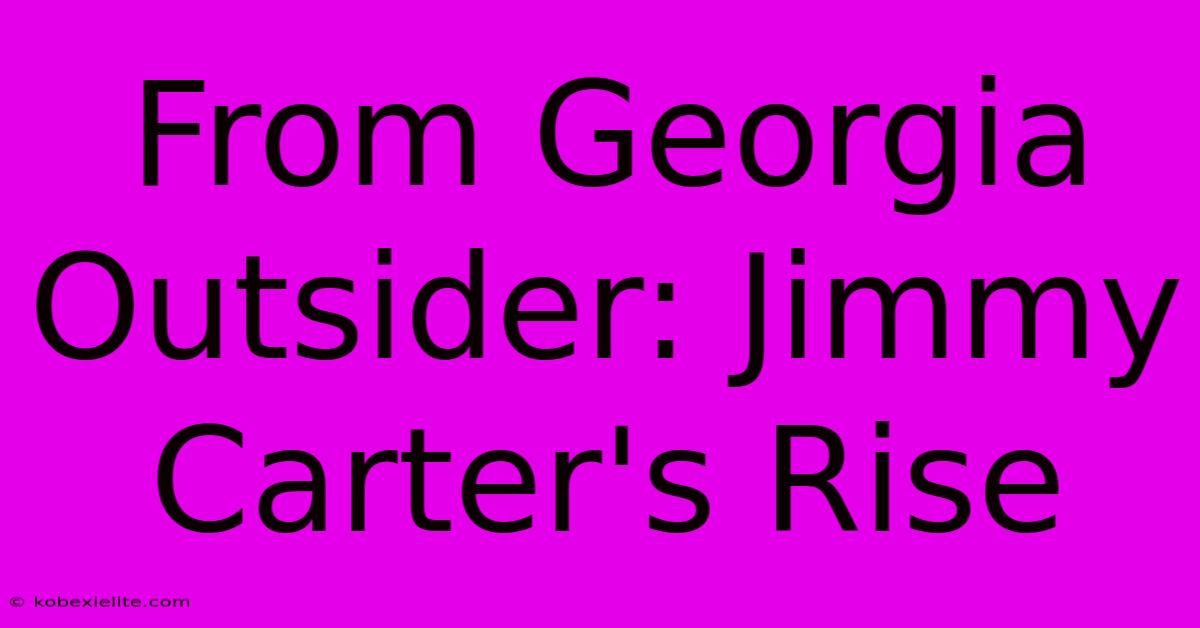From Georgia Outsider: Jimmy Carter's Rise

Discover more detailed and exciting information on our website. Click the link below to start your adventure: Visit Best Website mr.cleine.com. Don't miss out!
Table of Contents
From Georgia Outsider: Jimmy Carter's Rise to the Presidency
Jimmy Carter's journey to the White House is a compelling narrative of an unlikely candidate who defied expectations and captured the hearts of a nation yearning for change. His ascent wasn't fueled by the traditional trappings of political power, but rather by a quiet determination, a deep-seated faith, and a potent message of honesty and integrity. This article explores the key elements that propelled this Georgia peanut farmer from relative obscurity to the highest office in the land.
The Making of an Outsider: Early Life and Political Beginnings
Carter's early life in rural Georgia shaped his worldview. Growing up on a family peanut farm instilled in him a strong work ethic and a deep connection to the land. This upbringing, coupled with his naval service, provided a foundation for his later political career. Unlike many politicians who rose through the ranks of established party structures, Carter cultivated a grassroots approach.
A Different Kind of Politician:
He wasn't a charismatic orator in the mold of a Kennedy or a seasoned Washington insider. Instead, his appeal lay in his authenticity. He presented himself as a plain-spoken, honest man, a stark contrast to the perceived corruption and cynicism that plagued American politics in the 1970s. This "outsider" status resonated deeply with a public disillusioned by the Vietnam War and the Watergate scandal.
The Georgia Governor: A Springboard to National Attention
Carter's time as Governor of Georgia proved crucial in his presidential bid. He tackled issues such as education reform and environmental protection, showcasing his commitment to pragmatic governance. His success in Georgia demonstrated his ability to lead and bridge partisan divides – a quality that would become increasingly important on the national stage.
Building a Foundation:
His governorship allowed him to build a network of support across the state and beyond. He gained valuable experience in navigating complex political landscapes and demonstrated his effectiveness as an administrator. This period was instrumental in building the credibility and name recognition he needed for a successful presidential campaign.
The 1976 Presidential Campaign: A David and Goliath Story
Carter's presidential campaign was a remarkable underdog story. Facing established figures within the Democratic Party, he employed a strategy focused on personal connection and grassroots organizing. He traveled extensively, meeting directly with voters and fostering a sense of intimacy rarely seen in national campaigns.
The "Washington Outsider" Message:
His campaign slogan, "A Government as Good as Its People," perfectly encapsulated his message. He promised a more ethical and transparent government, free from the influence of special interests and political maneuvering. This resonated powerfully with a public yearning for a fresh start and a return to basic values. He effectively portrayed himself as a capable alternative to the incumbent Republican administration.
The Election and its Significance
Carter's victory in 1976 was a watershed moment. It marked a shift in American politics, demonstrating that an outsider, lacking the traditional political connections and endorsements, could still triumph through hard work, authenticity, and a powerful message that resonated with the electorate. His win signaled a desire for a new era of leadership, characterized by honesty, integrity, and a commitment to public service.
Conclusion: A Legacy of Service
Jimmy Carter's rise from a Georgia peanut farmer to the President of the United States remains a compelling testament to the enduring power of grassroots mobilization and a message of genuine authenticity. While his presidency had its challenges, his story continues to inspire and serves as a reminder that political success can be achieved through dedication, integrity, and a deep connection to the people. His legacy extends beyond his time in office, embodying a commitment to service and a dedication to improving the lives of others. His post-presidency work in peacebuilding and humanitarian efforts further solidifies his unique place in American history.

Thank you for visiting our website wich cover about From Georgia Outsider: Jimmy Carter's Rise. We hope the information provided has been useful to you. Feel free to contact us if you have any questions or need further assistance. See you next time and dont miss to bookmark.
Featured Posts
-
Nets And Lakers Finalize Trade Deal
Dec 30, 2024
-
Mc Kees First Nfl Pass Big Doms Catch
Dec 30, 2024
-
T20 Series New Zealand Defeats Sri Lanka
Dec 30, 2024
-
Itv 1s Archie Stevens Critique
Dec 30, 2024
-
West Brom Sheffield United Play To 1 1
Dec 30, 2024
